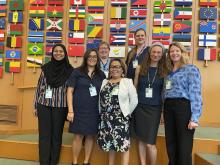High levels of chemicals in several toys could qualify them as hazardous waste
A study released today by IPEN and its members from ten countries reveals that shockingly high levels of the toxic chemicals chlorinated paraffins are common in children’s plastic toys. All thirty-one toys tested for the study were found to contain the harmful chemicals, which are linked to cancer, damage to developing brains, endocrine disruption, damage to the liver and kidneys, and threats to reproductive health.
The toys were purchased in Benin, Burundi, Cameroon, Democratic Republic of the Congo, India, Malaysia, Mali, Philippines, Uganda, and USA. All toys tested contained both short- and medium-chain chlorinated paraffins (SCCPs and MCCPs), even though SCCPs were banned globally under the Stockholm Convention in 2017. MCCPs are currently under evaluation for a potential global ban and evidence shows they are equally harmful and warrant the same action. Several toys contained levels of SCCPs above the current proposals to limit amounts of the chemical in hazardous waste, meaning the toys could be considered hazardous waste under health-protective guidelines.
“We were very disturbed to find that our children’s toys contain these highly toxic chemicals. Many plastics contain toxic chemicals, and our study shows these chemicals can make their way into our homes in products our children and families use,” said Mme. Kouyaté Goundo Sissoko from ONG Appui pour la Valorisation et la Promotion des Initiatives Privées (ONG AVPIP] in Mali. “Industry must end their use of toxic chemicals in plastics. Our children deserve safe toys.”


